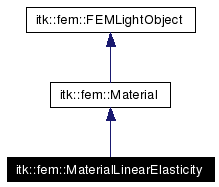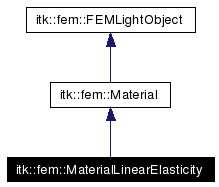
#include <itkFEMMaterialLinearElasticity.h>
Inheritance diagram for itk::fem::MaterialLinearElasticity:


Public Types | |
| typedef MaterialLinearElasticity | Self |
| typedef Material | Superclass |
| typedef Self * | Pointer |
| typedef const Self * | ConstPointer |
Public Member Functions | |
| virtual Baseclass::Pointer | Clone () const |
| virtual int | ClassID () const |
| virtual void | Read (std::istream &f, void *info) |
| virtual void | Write (std::ostream &f) const |
| MaterialLinearElasticity () | |
Static Public Member Functions | |
| Self::Pointer | New () |
Public Attributes | |
| double | E |
| double | A |
| double | I |
| double | nu |
| double | h |
| double | RhoC |
Static Public Attributes | |
| const int | CLID |
This class includes material and other kind of properties required to define material properties of finite elements applied to linear elasticity problems in FEM toolkit.
Definition at line 37 of file itkFEMMaterialLinearElasticity.h.
|
|
Const pointer or SmartPointer to an object. Reimplemented from itk::fem::Material. Definition at line 38 of file itkFEMMaterialLinearElasticity.h. |
|
|
Pointer or SmartPointer to an object. Reimplemented from itk::fem::Material. Definition at line 38 of file itkFEMMaterialLinearElasticity.h. |
|
|
Standard Self typedef. Reimplemented from itk::fem::Material. Definition at line 38 of file itkFEMMaterialLinearElasticity.h. |
|
|
Standard Superclass typedef. Reimplemented from itk::fem::Material. Definition at line 38 of file itkFEMMaterialLinearElasticity.h. |
|
|
Default constructor only initializes the members. |
|
|
Virtual function to access the class ID Implements itk::fem::FEMLightObject. Definition at line 38 of file itkFEMMaterialLinearElasticity.h. |
|
|
Create a new object from the existing one Implements itk::fem::FEMLightObject. |
|
|
Object creation in an itk compatible way Definition at line 38 of file itkFEMMaterialLinearElasticity.h. |
|
||||||||||||
|
Read an object data from input stream. Call this member to initialize the data members in the current object by reading data from provided input stream. Derived classes should first call the the parent's read function, to initialize the data from parent. Note that you must manually create the object of desired type using the FEMObjectFactory before you can call read function (this is pretty obvious). In this class only the global number is read from file. Derived classes may require some additional info in order to perform the reading. Pack this info in an object and pass a pointer to it in the info parameter. If you need runtime typechecking, use a polymorphic class and dynamic_cast operator inside the implementation of Read. Reimplemented from itk::fem::FEMLightObject. |
|
|
Write an object to the output stream. Call this member to write the data members in the current object to the output stream. Here we also need to know which derived class we actually are, so that we can write the class name. The class name is obtained by calling the virtual ClassID() member function and passing the result to the FEMObjectFactory. Implementations of Write member funtion in derived classes should first call the parent's implementation of Write and finaly write whatever they need. Reimplemented from itk::fem::FEMLightObject. |
|
|
Cross section area of a line element Definition at line 59 of file itkFEMMaterialLinearElasticity.h. |
|
|
Class ID for FEM object factory Definition at line 38 of file itkFEMMaterialLinearElasticity.h. |
|
|
Young modulus Definition at line 54 of file itkFEMMaterialLinearElasticity.h. |
|
|
Thickness Definition at line 74 of file itkFEMMaterialLinearElasticity.h. |
|
|
Moment of inertia Definition at line 64 of file itkFEMMaterialLinearElasticity.h. |
|
|
Poisson's ratio Definition at line 69 of file itkFEMMaterialLinearElasticity.h. |
|
|
Density times Heat Capacity Definition at line 83 of file itkFEMMaterialLinearElasticity.h. |
 1.3.5 written by Dimitri van Heesch,
© 1997-2000
1.3.5 written by Dimitri van Heesch,
© 1997-2000